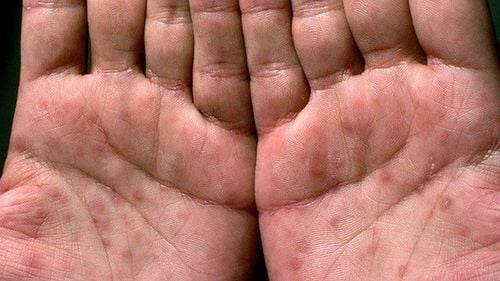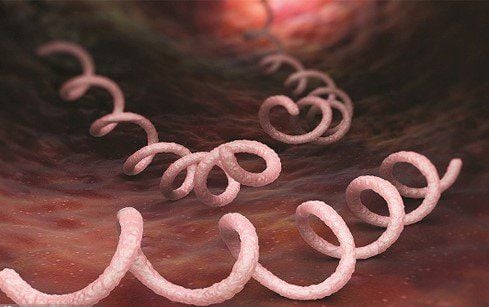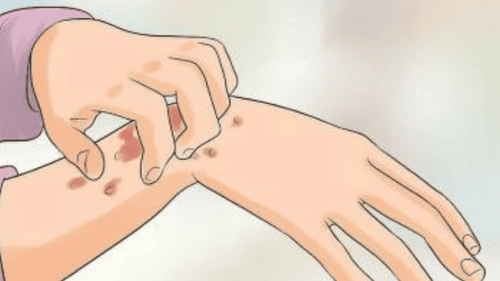This is an automatically translated article.
The article is professionally consulted by Master, Doctor Tran Thi Vuong - Doctor of Microbiology - Laboratory Department - Vinmec Hai Phong International General Hospital.Currently, many young people with syphilis are often hesitant to go to specialized hospitals for treatment, but instead go to some private clinics or buy drugs themselves. This is quite dangerous because incorrect diagnoses, not early detection or incomplete treatment will lead to unpredictable consequences for those who have syphilis.
1. What is syphilis?
Syphilis is one of the common social diseases, caused by a type of spirochete bacterium called Treponema pallidum. This type of spirochete has a rapid transmission rate through unprotected sex (The most spread is during period 1, ie 10-90 days after infection).
Syphilis is divided into several stages of disease development, in which the incubation period usually lasts from 3 to 4 weeks. However, there are also cases where the disease appears as soon as the 10th day and also after 90 days, there are gradually clear symptoms.
Syphilis is a dangerous disease that needs to be detected early and treated properly to ensure health and also to stabilize the patient's psychology because this is one of the most sensitive diseases. One of the ways to confirm if you have syphilis is to get tested as soon as there are suspicious signs.

Giang mai là căn bệnh nguy hiểm cần được phát hiện sớm và điều trị đúng cách
2. The stages of development of syphilis
When infected with syphilis, the patient will go through stages with the following symptoms:
2.1 Syphilis stage 1 At first, the typical symptoms of syphilis will appear between 6 - 8 Last week it disappeared.
Conspicuous manifestations will be ulcers in the genitals. Non-itchy, painless, superficial ulceration and stiff leg accompanied by solid lymph nodes in the vicinity. In the exudate of the ulcer and the fluid in the lymph node, there are many syphilis spirochetes. This is a period of strong contagion. In men, the affected part is the glans penis. For women, it is the labia majora, the vagina, and the uterus. The sores, slides are usually round or oval, red, do not appear pus. With or without treatment, the ulcer will go away.
2.2 Stage 2 Syphilis The patient will change to stage 2 syphilis from 6 to 9 months after the syphilis is detected. At this time, the typical signs that anyone can see are the appearance of papules, a pink rash (erythema) that looks like a blister, recurs many times, sores. on the skin and mucous membranes appear again and more. The patient's genitals are enlarged and swollen lymph nodes in the groin, neck... In some cases, the patient may feel fatigue, hair loss, joint pain ...
2.3 Syphilis stage 3 When syphilis has progressed to stage 3, the patient has reached the dangerous threshold of the disease. At this stage, spirochetes have invaded and developed in organs in the human body such as the heart, liver, muscles, nerves, etc. a series of dangerous complications for the patient.

Khi bệnh giang mai đã tiến tới giai đoạn 3 tức là người bệnh đã chạm đến ngưỡng nguy hiểm của bệnh
3. When to get tested for syphilis?
Syphilis not only leaves a lot of consequences for the patient himself, but also affects the people around, especially the sexual partner of the patient. With the specific manifestations through each stage as above, if there are any signs of syphilis, the best way is to find a reputable medical facility to perform the necessary tests. set. The incubation period of syphilis is quite long, so early detection and timely treatment will reduce the risk of complications for patients.
3.1 Syphilis tests 3.1.1 Black background microscopy This is a method usually applied to patients in the early stages, when spirochetes of syphilis have not yet entered the body's bloodstream. The doctor will first take a sample from the patient's own sores, vaginal or urethral fluid. Then use a black background microscope to observe or the specimen will be stained with a special method (Fontana-Tribondeau), looking for the presence of pathogenic spirochetes.
If spirochetes are found in the form of a mobile spring (in case of fresh examination under a black background microscope) it is considered that the patient has syphilis.
3.1.2 RPR Screening Test The RPR Syphilis Screening Reaction is usually done with patients who are in stage 2 (especially latent syphilis). The test mechanism is to look for syphilis antibodies produced by our body to fight the pathogen. This is a non-specific reaction, so there may be false positive cases for some other diseases such as malaria, fatty kidney disease, or pregnant women over 7 months. Therefore, this nonspecific reaction must be performed twice to check (reproducibility) the results.
3.1.3. Syphilis-specific antibody test With the same mechanism as RPR, this test is aimed at checking for syphilis antibodies in the body. Your doctor may collect a sample of your blood or cerebrospinal fluid to look for the presence of antibodies against the bacteria that cause syphilis. Currently, there are two most used tests, TPHA test (or TPPA) for qualitative/quantitative purposes and Syphilis test (automatic/rapid test), both of which are tests for specific antibodies to spirochetes. roof.
3.2 Notes when performing tests To diagnose syphilis accurately and have reasonable treatment regimens, patients when going to the doctor need to adhere to the following principles:
Accurately and truthfully declare their status condition, medical history. Answer correctly and sufficiently the doctor's questions to determine the cause of the disease as well as take necessary preventive measures. Perform syphilis tests according to the advice and instructions of a specialist. In addition to choosing reputable medical centers and specialized facilities, you also need to learn more about the common ways to test for syphilis today
Any questions that need advice, you can contact Contact Us Vinmec Health System nationwide, or register for an online examination HERE.
MORE:
When to think about getting tested for STIs? Syphilis can be transmitted from mother to child through the placenta Syphilis: Causes, ways of transmission, signs to recognize














